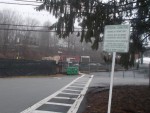Railroad Parking Lot Fees Proposed to Rise in Mt. Pleasant

The cost of parking at the Valhalla and Hawthorne Metro-North station parking lots in Mount Pleasant appears likely to rise in 2015.
The town board has scheduled a public hearing for Jan. 13 at 8 p.m. on a proposal to raise most of the parking fees at the two lots. Fees last rose in January 2013.
The proposal calls for a hike in the annual parking pass for town residents from the current $215 to $235, an increase in the cost of the annual parking pass for non-residents from $500 to $600 and to raise the cost of a seven-day parking pass from $15 to $20 for residents and from $25 to $45 for non-residents.
A yearly student pass for residents ($75) and five-day passes for seniors ($5) would not change.
Councilman Mark Rubeo said the parking fee increases were needed to meet rising costs for maintenance and security, among other expenses connected with the lots.
Following the board’s Dec. 23 meeting, Supervisor Carl Fulgenzi said Metro-North is proposing to increase the monthly cost of leasing its land from the current $800 to $2,000, but the town will meet with Metro-North officials in hopes of limiting that increase.
Con Edison Suit Settlement
The board also set a second public hearing for Jan. 13 regarding a proposed resolution it has drawn that is expected to avert a threatened lawsuit by Con Edison against the town.
The utility had previously informed officials it was planning to sue Mount Pleasant because the municipality overstepped its bounds in regulating utilities through Chapter 204 of the town code. The state Public Service Commission, not the town, has the authority to regulate utilities, Con Edison has contended.
If the draft resolution is adopted by the town board, it would repeal the portion of the town code regulating utilities. However, it also stipulates that Con Edison would have to pay Mount Pleasant $10,000 for costs associated with the town’s previous inspection of its utility poles. Con Edison would also have to meet with town officials to update them on previous, current and future projects and provide a plan to remove its double and triple poles in the town’s right of way.
The utility would also have to notify the town about work it was planning to do in the right of way, including when there are emergency situations.
